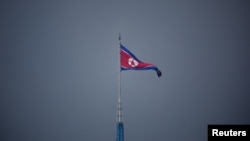Seoul is circulating the idea of normalizing Washington-Pyongyang ties even before North Korea takes a potential step toward denuclearization, but experts said the notion is likely to be rejected by the U.S. as well as North Korea.
As denuclearization is increasingly seen as an unlikely outcome amid stalled diplomacy and North Korea's preparation for what would be its seventh nuclear test, Seoul is considering a push toward normalization seen as an effort to engage Pyongyang.
Washington and Pyongyang do not have diplomatic relations, and the goal of forging normal ties has been sought between the two and Seoul as an outcome of denuclearization since negotiations began in the early 1990s.
Recently, however, the idea of normalization is being suggested by the Yoon government as an upfront effort prior to denuclearization.
Speaking before the press on August 17 to mark his first 100 days in office, President Yoon Suk Yeol said Seoul would provide support for normalizing relations between Washington and Pyongyang. This support would be part of the "audacious initiative" he mentioned in his speech made on August 15 promising economic assistance if North Korea stops developing nuclear weapons.
At a plenary session of National Assembly's Foreign Affairs and Unification Committee on August 18, Unification Minister Kwon Young-se said normalization could be possible in the beginning of a negotiation process as long as Pyongyang shows intention toward denuclearization.
The ruling People Power Party's representative Thae Yong-ho, a former North Korean deputy ambassador to the U.K. who defected to the South in 2016, said in an August 24 interview with a South Korean newspaper that negotiations would go smoothly if Washington normalized its relations with North Korea and established an embassy in Pyongyang.
Joseph DeTrani, the special envoy for the six-party denuclearization talks with North Korea, was a panelist on Friday on Washington Talk, a TV panel program presented by VOA's Korean Service. He said that for Washington, normalizing ties with North Korea has been the end goal of denuclearization.
"The normalization of relations with North Korea — from 30 years of negotiations with North Korea, despite the fact they were failed negotiations — was the end" of negotiations, said DeTrani.
"Once we got complete verifiable denuclearization, that would lend itself to the normalization of relations. That was the end of the process," continued DeTrani.
As laid out in the Agreed Framework in 1994, the two countries decided they would move toward normalization of political and economic relations after North Korea freezes and dismantles its nuclear weapons program in exchange for security and energy guarantees from the U.S.
More recently, during the Singapore summit in June 2018, Pyongyang and Washington agreed to improve their ties as North Korea took steps toward denuclearization. The subsequent Hanoi summit in February 2019 failed due to differences over the timing of sanctions relief and denuclearization.
North Korea resumed testing its weapons in May 2019, shortly after the talks failed. Talks between Washington and Pyongyang have been deadlocked since October 2019 after working level talks dissolved without progress. This year, it has conducted 19 weapons tests including an intercontinental ballistic missile (ICBM) capable of reaching the U.S.
Patrick Cronin, the Asia-Pacific Security Chair at the Hudson Institute, said, "Taking steps toward nuclear stability and denuclearization would be essential before approaching the subject of regular diplomatic recognition."
"America will not give North Korea the symbols of legitimacy unless Pyongyang demonstrates an interest in upholding a peaceful, rules-based order," he continued.
Harry Kazianis, president of the bipartisan national security think tank Rogue States Project, said, "There is no chance that the Biden administration would ever go along with the idea of normalizing relations with North Korea before it made some sort of big step toward denuclearization."
In response to VOA's Korean Service request for comments on Seoul's proposal, Vedant Patel, deputy spokesperson for the U.S. State Department, said Washington is focused on dealing with North Korea's threats.
"The United States remain focused on coordinating closely with our allies and partners to address the threats posed by [North Korea], which include advancing our shared objective of the complete denuclearization of the Korean Peninsula and continuing our ironclad commitment to the defense of [South Korea] and Japan."
VOA’s Korean Service contacted South Korea's presidential office and North Korea's U.N. mission in New York City for comments but neither responded.
Frank Aum, senior expert on Northeast Asia at the U.S. Institute of Peace, said the idea of normalizing first "in order to achieve progress on denuclearization" has "some merit" as talks remain stalled.
However, Aum continued, "The political likelihood that Washington could actually normalize relations with Pyongyang before denuclearization is fairly low."
He added U.S. lawmakers would also want to see progress on human rights before normalization.
North Korea has long sought normalization with the U.S. as a way to boost its international standing, but experts said the regime might not be as interested in establishing good relations with Washington as in the past.
Ken Gause, director of the Adversary Analytics Program at CNA, said, "It's a good idea to start talking about normalization of relations as being the first step in the relationship" as opposed to "denuclearization, which happens further down the line."
But he believes North Korea is unlikely to engage with the U.S. to normalize ties unless "upfront concessions" are made providing sanctions relief.
Aum said, "Diplomatic normalization without economic normalization is ultimately not useful for Pyongyang."
He continued, "North Korea is interested in economic progress," but "it wants progress on its own terms and not according to South Korea's agenda. North Korea would rather prefer sanctions relief, which would allow it to engage in its normal export and import activities without constraint."







